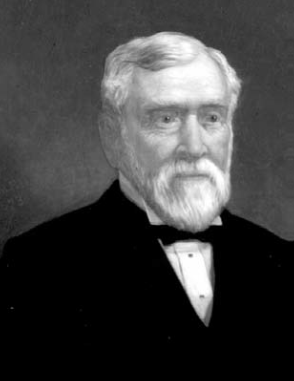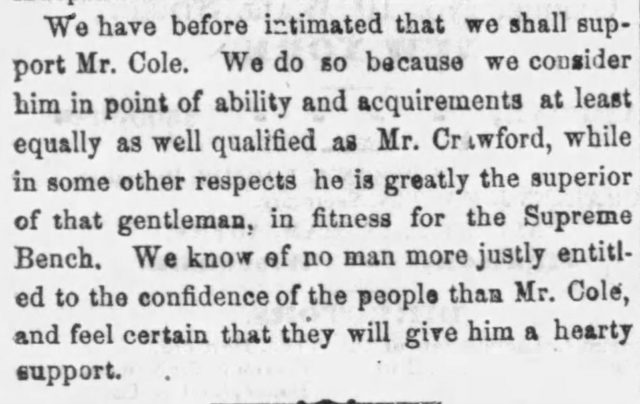“Miss Goodell will be admitted to practice in this court.”
Wisconsin Supreme Court Justice Oramus Cole, June 18, 1879
Lavinia Goodell’s name will forever be linked with that of Wisconsin Supreme Court Chief Justice Edward Ryan since he was the author of the infamous opinion that held only men were eligible to practice law in Wisconsin and denied Lavinia’s first petition for admission to practice before the Wisconsin Supreme Court . (Read more here). Ryan’s life and career have been heavily scrutinized for 150 years, but the justice who, in 1879, authored the very short opinion granting Lavinia’s second motion to be admitted to the Supreme Court bar receives much less attention. That is unfortunate because Justice Orasmus Cole was a valued member of the Wisconsin Supreme Court for nearly four decades.

Cole was born in New York State in 1819. Both of his grandfathers served in the Revolutionary war. He studied law and was admitted to the New York bar in 1845. Late that year he settled in the small southwest Wisconsin mining town of Potosi. In 1847, he served as a delegate to the second Wisconsin constitutional convention. In 1848, after the constitution was ratified, the Whig party nominated Cole as their candidate for Congress. He won the election. He refused to support the fugitive slave provisions of the 1850 compromise that gave new states coming into the union the choice of whether to allow slavery, and he was defeated in his 1850 bid for reelection.
Cole was elected to the Wisconsin Supreme Court in 1855, defeating incumbent justice Samuel Crawford, largely because of Cole’s opposition to the fugitive slave laws. While many newspapers urged retaining Justice Crawford, the Wisconsin State Journal supported Cole’s candidacy:

Read here the State Journal’s front page commentary a week after the election when all votes had been counted and Cole was declared the winner.
While Chief Justice Ryan’s 1875 opinion denying Lavinia Goodell’s admission to practice before the Supreme Court contained a great deal of gratuitous commentary about the proper sphere for women, Justice Cole’s 1879 spare, one-paragraph decision – to which Ryan dissented – stated that while in 1875 there was no statutory authority for the admission of women to the bar, the legislature had since remedied that deficiency, as Ryan had said it could do. As a result, Justice Cole wrote:
We are satisfied that the applicant possesses all the requisite qualifications as to learning, ability and moral character to entitle her to admission, no objection existing thereto except that founded upon her sex alone. Under the circumstances, a majority think that objection must be disregarded. Miss Goodell will therefore be admitted to practice in this court upon signing the roll and taking the prescribed oath.
Read the entire decision here.
Justice Cole remained on the court until 1892 and served as Chief Justice the last twelve years, assuming that position upon Chief Justice Rya’s death. Cole was the longest serving member of the court until 2013 when Chief Justice Shirley Abrahamson’s tenure exceeded his. He died in 1903 at the age of 83, having outlived Lavinia Goodell by twenty-three years. Chief Justice John Cassoday, Lavinia Goodell’s old Janesville friend and mentor, who as speaker of the Assembly had introduced Lavinia’s bill to change the law to allow women to become members of the bar and who had been appointed to the court after the death of Chief Justice Ryan, offered these remarks upon the death of his colleague:
Judge Cole was not a genius with powers to thrill and capture the multitude, but a patient, plodding, and conscientious judge, who determined to do what he conceived to be his duty, regardless of possible clamor or personal consequences. He was not born for, and did not covet, leadership, but was always attentive and indefatigable in the performance of the work on hand., He was never aggressive but always thoughtful, laborious, and firm. … It has been said by some wise man … that the gentle spirit makes the hero after all. Judge Cole was that kind of man. He was very methodical in his habits, persistent in his application, pure in his purposes, intolerant of all duplicity or wrong, and upright in his judgments.
The lifework of Orasmus Cole is finished, and the people of Wisconsin all unite in saying that he was a model judge, a model gentleman, and a model man.
Sources consulted: Orasmus Cole: In Memoriam, 119 Wis. xxviii; https://en.wikipedia.org/wiki/Orsamus_Cole; Wisconsin State Journal (March 3, 1855 and April 11, 1855).







